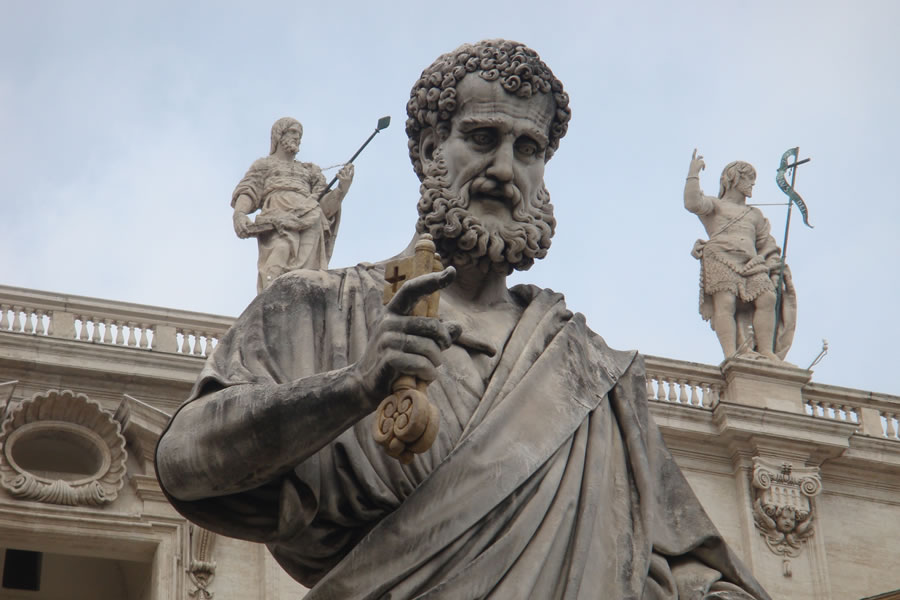Blog & Pastor Letters

Twenty-First Sunday in Ordinary Time - August 27, 2023
08-27-2023Weekly ReflectionFr. Joseph ZwostaIn his prophetic 1907 novel Lord of the World, Msgr. Robert Hugh Benson describes a future society dominated by Marxism, atheism, and secular humanism. At the beginning of the book, the Catholic Church is allowed to operate in a limited fashion, though her influence over ordinary life is almost non-existent. Evils such as physician-assisted suicide are commonplace. Eventually, a charismatic politician gains enormous power and leads an outright persecution of the Church. A small group of faithful priests and laity keep the Church on earth alive. Without giving away too much of the ending, the gates of hell do not prevail against her.
Today more than ever, Catholics need to hear that promise that Christ made to St. Peter: “The gates of the netherworld shall not prevail against it.” (Mt 13:18) As Msgr. Benson understood so well, that promise does not mean that the Church will always have influence over a society; it does not mean that the members of the Church will not face persecution and even martyrdom; it does not mean that the Church will retain every structure and resource that she currently enjoys; it does not mean that local churches (dioceses) will never disappear. Christ’s promise does mean that no matter what happens, the Church will “continue to stand firm until the end of time.” (Vatican I, Dei Filius)
In today’s Gospel, our Blessed Lord establishes Simon Peter as the rock upon which He will build His Church. He promises to give him the “keys to the kingdom of heaven” and the power to bind and to loose. (Mt 13:19) Catholics recognize in this passage a clear statement about the primacy of St. Peter and his successors, the popes, over the universal Church. We may wonder why the Lord chose to establish the Church in this way. We may wonder why He chose Simon Peter for this role. After all, the Gospels give us plenty of information about Peter’s flaws during the Lord’s public ministry. He often speaks without thinking. He frequently acts impetuously. The weakness of his faith is often exposed. After the Lord is arrested, Peter denies knowing him three times. Yet after Christ rose from the dead, He gave Simon the chance to re-affirm his love for Him three times and He confirmed his mission to feed His flock.
When we read the Acts of the Apostles, we see that Peter is transformed by the Gift of the Holy Spirit at Pentecost. He is confident in his faith and able to articulate it with great eloquence. He is prudent about making crucial decisions for the early Church and mindful that the other apostles have also been entrusted with roles of governance. St. Peter is courageous in the face of opposition and persecution. In this book, we are given a portrait of a man empowered by God’s grace to fulfill the formidable task of shepherding the Lord’s flock in those early years of the Church. Ultimately, he would submit to crucifixion like his Master, asking in humility to be turned upside down. This martyrdom crowned a life of feeding the flock and loving Christ.
St. Peter’s life is a testimony to the fact that whenever the Lord calls us to a vocation or state in life, he gives us all the grace we need to fulfill it. Those called to be bishops, priests, or deacons receive through the Sacrament of Holy Orders special graces proper to each office. These graces empower them to exercise well the duties that the Lord entrusts to His ordained ministers. Similarly, the Sacrament of Marriage bestows graces upon Christian husbands and wives, that they may be faithful to the promises that they have made. Aside from these sacramental graces, the Catechism reminds us of the “graces of state that accompany the exercise of the responsibilities of the Christian life and of the ministries within the Church.” (CCC 2004) We may think especially of the spiritual gifts that God provides to those who enter into consecrated life, that they may be faithful to their vows of poverty, chastity, and obedience. Graces of state are also given, for example, to those who teach the faith in universities, schools, and parishes.
Every member of the Church has a duty to pray in a special way for those who have been entrusted with the task of feeding the Lord’s flock. On Holy Thursday, Christ said to St. Peter: “Simon, Simon, behold Satan has demanded to sift all of you like wheat but I have prayed that your own faith may not fail; and once you have turned back, you must strengthen your brothers.” (Lk 22:32) The Supreme Pontiff and the bishops in communion with him are entrusted with the monumental task of teaching, sanctifying, and governing the Church. The Evil One constantly seeks to thwart their work and that of priests and deacons. All of us must pray that the Lord continue to pour forth abundant graces upon them that they may be faithful in carrying out the work that He has given them to do. We must also pray for the perseverance of those in consecrated life and the steadfastness of married couples.
Christ has promised that the gates of hell will never prevail against the Church. Though we may become discouraged when the world seems to oppose the Gospel in so many ways, we renew our trust in the Lord’s promise. We give thanks for the Church that He has established upon the rock of Peter. We renew our commitment to carry out the work that He has given us to do. We pray that every member of the Church may do the same.
BACK TO LIST